




 |
   |
 |
|
Sparkwood Amy Speace Spectrum Road Spektakel |
Spellbound Jim Spencer Jon Spencer Blues Explosion Spent Poets |
Sphere³ Spiders From Mars Spinal Tap Spinanes |
Mani Spinx Spiraling Spirit of Christmas |
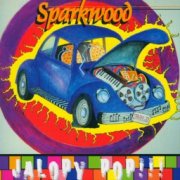 |
Jalopy Pop!!! (2005, 58.35) ***½/TT½ |
|
| Checklist Miles Away Cruel World D Past Experience In Your Lovin' Arms Ready for the Day Where She Ought to Be |
Wishing You Well Nichole's Overture Emergency Glimpse of Hope 3 Words Train Song |
|
Current availability:
Mellotron used:
Sparkwood are a Texan powerpop outfit, as much ELO and Queen as The Byrds and The Beatles. Actually and as sick as you must be of my using the comparison, Jellyfish would definitely have a lot to answer for here, if there were anything to answer for at all. Sparkwood's second album, 2005's Jalopy Pop!!!, is a glorious technicolo(u)r riot of summery pop with clever twists and turns, allied to a slightly Beach Boys-ish melancholy on the lyric front; in fact, there are distinct hints of that outfit in some of the arrangements, notably the occasional woodwind interjections, although the overall level of compositional complexity is unsurprisingly lower. After the silly, forty-second synth parameter checklist, er, Checklist (did I say the album's stuffed with analogue synth parts?), top tracks include opener proper Miles Away, Past Experience and Wishing You Well and although the half-arsed rock'n'roll of Where She Ought To Be is slightly unnecessary, it really doesn't diminish the overall listening experience.
Band mainman Bart Padar plays seemingly uncredited Mellotron, although its 'realness' doesn't appear to be in question, given the wobbly state of the strings on Cruel World, wavering to a halt at the end. Thankfully, it doesn't stop there, with raucous strings, cellos and flutes on Ready For The Day, flutes on Nichole's Overture and Glimpse Of Hope and a final string part on 3 Words, some 'featuring' more of those M400 wobblies. I almost feel I should've given this four stars; it sits right on the cusp and maybe another couple of plays would tip it over, although bright'n'breezy listening fatigue could also set in. It could go either way. Generally speaking, though, a great little album, although I think they could've trimmed a bit from its length, not least the general messing about between 3 Words and unlisted extra track Train Song. Plenty of clearly genuine Mellotron, too, making this a bit of an all-round winner, I think.
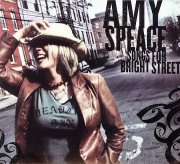 |
Songs for Bright Street (2006, 53.41) ***/T½ |
|
| Step Out of the Shade Water Landing Not the Heartless Kind Two Shed This Skin The Real Thing Make Me Lonely Again |
Dreaming Right Through to Me Row Row Row Can't Find a Reason Double Wide Home |
|
Current availability:
Mellotron used:
Listening to the first few tracks of Amy Speace's third album, 2006's Songs for Bright Street, you'd be forgiven for thinking she inhabits the rockier end of the Americana spectrum, but before you know it, it quietens down into a relatively 'trad' country effort, albeit one vastly better than the average. Her humour shines through on the lyric front, notably on Double Wide; actually, the lyrics are where this album shines, as with so much country, although for once, the music doesn't offend either.
Speace plays the Mellotron herself, with a very real-sounding string part on Water Landing and string and cello parts on closer Home that come in slowly then go stratospheric. So; two good Mellotron tracks on a decent-for-country record, which can be taken as a recommendation if you like.
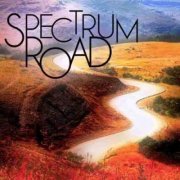 |
Spectrum Road (2012, 55.56) ****/TTT |
|
| Vuelta Abajo There Comes a Time Coming Back Home Where An T-eilan Muileach Vashkar One Word Blues for Tillmon |
Allah Be Praised Wild Life |
|
Current availability:
Mellotron used:
Consisting of full- or part-time fusionists Vernon Reid (Living Colour's wunderkind guitarist), drummer Cindy Blackman, Jack Bruce and John Medeski, Spectrum Road are something of a supergroup, formed as a tribute to The Tony Williams Lifetime (Williams died in 1997). Having not heard their source material, I can't say whether they've changed anything very much from the originals (mostly Lifetime, with a handful of Williams solo pieces), although I suspect some of Reid's more out-there guitar work goes further than John McLaughlin ever dared forty years earlier. Or not? The best way of approaching this is to realise that subtlety isn't really an option, after which you can't go too far wrong. Best tracks? I prefer the instrumental workouts, so I'll nominate fiery opener Vuelta Abajo, the lengthy Where and closer Wild Life.
Medeski plays Mellotron, of course, with typically fragmented string lines on Vuelta Abajo, phased cellos on Coming Back Home, more skronky strings on Where, wobbly cello on Blues For Tillmon, amusingly out-of-place strings on boogie workout Allah Be Praised and (slightly) more sedate ones on Wild Life. All in all, a fine album that makes me want to track down the originals, despite not being a fusion fan, although, having heard these versions, I may pine for Reid's combustible guitar work.
See: Jack Bruce | John Medeski
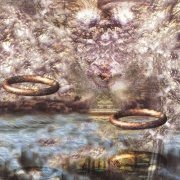 |
Spektakel (1996, recorded 1974, 62.13) ****/TTTT½The Eternal QuestionBig Boss Eyes 7 Pounds Tommy No No Not You (live) |
Current availability:
Mellotron used:
Spektakel are one of those long-lost bands whose material suddenly pokes its head up above the parapet decades later. The main reason this CD, recorded in 1974, is of note is that two of the band's four members, Eduard Schicke and Heinz Fröhling went on to become two thirds of legendary German synth/prog outfit SFF, or Schicke Führs Fröhling. You can hear a similarity between the two bands in places, although Spektakel are best described as symphonic progressive with improvisational overtones, sometimes with vocals, with less of the electronic influence of the later band. It's powerful stuff, though, standing up well against better-known bands of the era; in fact, I'd go as far as to say that they were potentially one of the best German symphonic bands, beating Novalis, Eloy et al. at their own game. SFF's recently-released Live in Papenburg, Autumn 1975 quite effectively displays the crossover period between the two bands, with longer workouts than those recorded by SFF, though still tightly arranged, fairly reminiscent of much of the material on Spektakel.
There's a shedload of Mellotron on offer here, played by both Fröhling and full-time keyboardist Detlef Wiedecke. All four tracks (the last, No No Not You is listed as a 'bonus live track') have large helpings of strings, with a several minute Mellotron flute solo section plus extra added cellos in the aforementioned live track, which I suspect has been culled from a longer improv piece. It's noticeable how well all the tracks have been recorded, given a total lack of record company support at the time, not to mention the quality of the band's equipment; was somebody bankrolling them, possibly?
Anyway, this is a pretty damn' good prog album and a minor Mellotron classic. Top marks to US prog reissue specialists The Laser's Edge for exhuming this and making it available in such superb quality. Buy.
See: Schicke Führs Fröhling | Führs and Fröhling
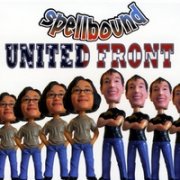 |
United Front (2010, 46.38) ***/T |
|
| Witch Doctor Girl's Got a Reputation Find Time for Love Soul Salsa Night Light A Woman's Touch Catchin' Up Next Girl |
Night on the Town Let's Spend the Night Together Comfort Me The Last Noel |
|
Current availability:
Mellotron used:
The L.A.-based Spellbound, founded by Bobby Moon and Paul Thomas, are described as 'a fusion of funk and tropical grooves', with which I find it difficult to argue. Amazingly they've been around for over twenty years and have a dozen or more releases under their collective belts, while remaining little-known to the general public. Well, I'd never heard of them before... United Front does what it does well, probably at its best on opener Witch Doctor, the irritatingly catchy Girl's Got A Reputation and Soul Salsa.
Roger Manning Jr. plays (presumably) his own M400 on the album, with some dirty string stabs on Soul Salsa (and its alternate version) and a more 'standard' string part on Next Girl, showing us what a real Mellotron actually sounds like, compared to the sampletastic hordes currently battering down the city gates.
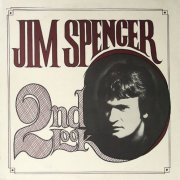 |
2nd Look (1974, 37.19) **½/TT½ |
|
| Second Look No Place to Land There Comes a Time What am I Doing Here? Just a Little Time With You Laura Fair Interlude Lament |
Next to You The Devil is a Fat Man (Downright Vatican Blackmail Boogie) |
|
Current availability:
Mellotron used:
Jim Spencer released two albums in the early '70s, the second of which, 2nd Look, veers between rather bland, countryish material and a more mainstream feel, notably on the funky What Am I Doing Here? and closer The Devil Is A Fat Man (Downright Vatican Blackmail Boogie). Best track? Lament, no contest, with its medieval tonalities, runners-up being Just A Little Time With You and The Devil Is A Fat Man.
Our old friend Sigmund Snopek III plays keys and, amusingly, 'strings and flute', or, as we know them, Mellotron, with strings on No Place To Land, a flute melody and strings on There Comes A Time, flutes doubled with synth on Just A Little Time With You, flutes doubled with Jay Borkenhagen's real one on Laura Fair and background cello and flutes on Lament. One of those 'has its moments' records, then, most of them Mellotronic.
See: Sigmund Snopek III
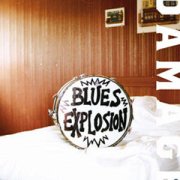 |
Damage (2004, 40.49) ***½/T |
|
| Damage Burn it Off Spoiled Crunchy Hot Gossip Mars, Arizona You Been My Baby Rivals |
Help These Blues Fed Up and Low Down Rattling Blowing My Mind |
|
Current availability:
Chamberlin used:
After leaving noted noiseniks Pussy Galore, Jon Spencer formed his Blues Explosion in 1991, fusing rockabilly, punk, garage rock and a host of other related styles into a heady stew of sweaty rock'n'roll. 2004's Damage is something like their seventh official full release, although some confusion surrounds their early discography due to a plethora of, at best, semi-officially released compilations of tracks from their first two recording sessions. While every track here fits the loose description 'rock'n'roll', they all take a separate approach to the style, from the almost-hard rock of Burn It Off, through the mutated country blues of Spoiled to the punk/psych of Mars, Arizona.
Chris Shaw plays Chamberlin on Crunchy, with strings, flutes and female voices; shame they didn't use it a bit more, but there you go. If you like the Blues Explosion, you'll already own this; if you don't, it sounds to me to be a fine place to start. One Chamby track helps in its appreciation 'round these parts, but probably means little in the grand scheme of things.
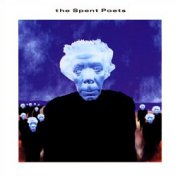 |
The Spent Poets (1992, 64.27) **½/TT½ |
|
| Mr. Einstein My Useless Heart Your Existential Past Grassheads Special Dogtown You Can't Kill Michael Malloy Walt Whitman's Beard |
He's Living With His Mother Now Ali Ali Ackbar The Rocks in Virginia's Dress You Don't Know Me Why Are You Sleeping With Mr. Brown? A Bad Case of Melancholy |
|
Current availability:
Mellotron used:
The Spent Poets were an early '90s pop/rock crew from San Francisco who released one, eponymous album, pilfering the then-current charts for inspiration, coming up with an album that sounds rather dated, 17 years on. Don't get me wrong; there's plenty of variety here, but their constant Beatles references have worn to paper thinness, especially since every two-bit Britpop act and their brothers (you know who I mean) jumped on the bandwagon.
In those presumably pre-easily available sample days, no fewer than three of the band are credited with Mellotron: Matthew Winegar, John Berg and Derek Greenberg, although I've no idea who played what and where. anyway, we get faint flutes on opener Mr. Einstein, cellos on My Useless Heart, strings and more obvious flutes on Special, strings towards the end of Dogtown and on Ali Ali Ackbar and Why Are You Sleeping With Mr. Brown?, although I doubt whether the strings on Walt Whitman's Beard have anything to do with Mellotrons.
All in all, then, a rather unexciting album, already sounding a bit old-fashioned, although I suppose saying 'a bit' means that it hasn't dated half as badly as a lot of stuff from that period. A surprising amount of Mellotron, anyway, although none of it's particularly inventive.
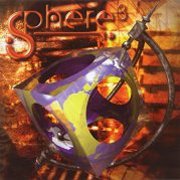 |
Comeuppance (2002, 52.57) ****½/TTT |
|
| A Good Example of Arbitrary Presumption Shrimp.Sng Sidewalking Natural Light First Kiss Eat First, Ask Questions Later An Unusual January December Gaze |
Tapestries Paralysis |
|
Current availability:
Mellotron used:
Sphere³ (originally just Sphere) have a long and (dis)honourable history on the UK prog scene (such as it is), having been around since the early '90s in one form or another. Their ridiculous flyers (for gigs or just for the hell of it) are legendary, as is their inability to get their shit together and release an album. They've put out a couple of cassette demos; an early, rather formative one and a far more commendable effort from the late '90s, which saw them moving towards the area they now inhabit. Since drummer Jamie Fisher's return from foreign climes (well, Australia) in '99, they've moved into warpspeed on the activity front, playing at least six times a year and constantly being sighted at all the wrong gigs.
Anyway, it's out at last. Apparently the earliest recording on it dates from 1997 and after their frenetic activities of late, it's understandable how the boys haven't had time to complete their slightly overdue debut. In fact, it's been an amusing spectator sport watching the esteemed Malcolm Parker's Cyclops label catalogue with its increasingly desperate 'Sphere³: due soon' entry over the last few years. All right, I'll stop taking the piss. The truth of the matter is, Comeuppance has been well worth the wait. It's not every day (/year/decade) that a British instrumental fusion-driven progressive band comes along; now they have, I sincerely hope the international progressive community takes them to their hearts. Of course, one advantage of spending so long 'getting it together (man)' is that the band have honed their material to perfection, pruning any dead wood that may have existed and ending up leaving off great material like Lights Coming Down.
So; Comeuppance: Sphere³ cover various bases within their chosen area, from the epic prog of Paralysis (originally released as a single in 2001) to the 'Jazz Club' sounds of An Unusual January. Nice. Most of the material is nearer prog than jazz and to be honest, there's nary a duff track to be heard throughout. Keyboard man Neil Durant bought his Mellotron in the late '90s, fitting it out with an unusual M300 strings/8 choir/church organ tape set, although he only seems to have used choirs on the album, usually to good effect, particularly on the aforementioned Paralysis, their standard set opener. It has to be said at this point that the musicianship is superb right across the board; Steve Anderson's guitar work is exemplary and Bill Burnett's bass playing, while occasionally slightly too 'muso', is excellent, slapping or no slapping. Don't let the 'jazz' comments put you off, by the way; I'm no jazzer, but I love this album. Definitely more of a 'prog with jazz inflections' record than vice versa.
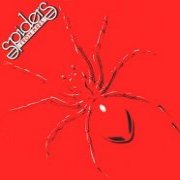 |
Spiders From Mars (1976, 41.45) **½/T |
|
| Red Eyes Shine a Light White Man Black Man Fallen Star Prisoner (I Don't Wanna Do) Limbo Stranger to My Door Good Day America |
Rainbow Can it Be Far Running Round in Circles |
|
Current availability:
Mellotron used:
I doubt whether you'll be surprised to hear that The Spiders From Mars consisted of rejects from Bowie's iconic backing band, sans the most talented member, Mick Ronson, leaving us with Trevor Bolder, Woody Woodmansey and Mike Garson, fronted by Kestrel's guitarist Dave Black and one Pete McDonald on vocals. I'm afraid to say that their sole, eponymous album, from '76, shows precisely why they were principally sidemen, the sub-Queenisms of the likes of White Man Black Man and (I Don't Wanna Do) Limbo or the middling rock of most of the rest failing to catch the public's attention. Better material includes storming opener Red Eyes, the propulsive Fallen Star and the rocky Can It Be Far, but it's a case of 'too little, too late', sadly.
Although Garson sticks chiefly to piano, as with his contributions to a couple of Bowie albums, he adds a smidgeon of Mellotron to the mix, with big choir chords all over the closing section of Stranger To My Door and in the middle eight and end section of Can It Be Far. This is (or at least, has been) available on CD, but it's difficult to recommend it to anyone other than Bowie offshoot completists (there is such a thing?), or the kind of collector who feels compelled to shine a light into every last murky corner of mid-'70s British rock.
See: David Bowie
 |
We Are All Flower People [a.k.a. The Incredible Flight of Icarus P. Anybody] (1968/69) **/TTTTT |
|
| We Are All Flower People Get Me Away From the Ground [unknown] To Fly [unknown] I am Flight [unknown] [unknown] |
[unknown] [unknown] [unknown] |
|
Current availability:
Mellotron used:
The strangest thing about Spinal Tap (don't forget the umlaut!) is that for a band with so much history, their albums are next to impossible to find. They come from London (Squatney, to be precise), roughly twelve miles from where I live (although, strangely, I've never been able to track the area down precisely), but have I EVER seen any of their original albums in a London second-hand shop? Have I hell (hole). Before 1984's This is Spinal Tap soundtrack album, they released thirteen (count 'em) albums, including the triple-live Jap Habit, originally on Japanese import only, but I have never, EVER seen hide nor hair of 'em and, to this day, the only Tap records I've ever seen are the soundtrack and 1992's excellent reformation effort, Break Like the Wind.
By a weird coincidence, just after reading the revised edition of Peter Occhiogrosso's Inside Spinal Tap (Abacus, 1992), I spotted a copy of The Incredible Flight of Icarus P. Anybody on someone's trade list, appended 'PQ': Poor Quality. They weren't kidding. My tape (not even CD-R) of this legendarily rare album is almost unlistenable and that's before you get to its actual content. It sounds like about an eighth-generation recording of a scratched, warped copy of the LP, overlaid with a horrible distortion that may or may not be present on the original recording (nothing would surprise me in the World Of Tap). What little I can hear of the actual music is, frankly, terrible; the very worst kind of pompous, pretentious, 'rock opera' psych you can imagine, making The Pretty Things' S.F. Sorrow look like the classic it is. The only reason I know anything about it at all is due to an interview with then-new boy bassist Derek Smalls right at the end of the book, where he goes into (slight) detail about the album. As you can see, I don't even have a proper tracklisting for the record, so what you see above is what I've been able to pick out from Smalls' description and the little you can hear of the lyrics.
Originally released in 1968 as We Are All Flower People, in a grotesque (and very Tap-like) cash-in on the previous year's mega-smash (yet still strangely unobtainable), Listen To The Flower People, most of the album consists of a series of linked tracks under the banner The Incredible Flight Of Icarus P. Anybody, under which title the album was reissued the following year, minus its title track, this being the version I've managed to obtain. The concept, such as it is, involves (according to Smalls), "A man who decided, like Icarus, that he would put on wings and fly - but that he would be a jet airliner and sell seats on himself to pay for the project". He describes it as "very acid-influenced" and he ain't kidding. It's also very Tap: its ineptitude is absolutely par for the course, as is its thorough idiocy, not to mention David St Hubbins' ridiculous lyrics and Nigel Tufnel's third-rate guitar histrionics.
So why am I reviewing this pile of junk? Why d'you think? Back to Smalls: "It was probably the heaviest use of Mellotron up until that time on a rock'n'roll album, which idea was stolen from us by you-know-who - by you-know-Moody-who. But we did it first and I think we got some sort of award from the Mellotron people for it, because it was really thick with Mellotron, it was all the way through. It just covered everything, like a Mellotron soup - which gave the album a distinctive kind of murk. A lot of it was that we were doing some bass work on the Mellotron, just some bass chords - because that was describing the ground that Icarus was trying to escape from. So there was this brooding sense of the ground that was in these heavy, thick fifths being played down in the bass range of the Mellotron. It was very, very dark". Derek, my friend, you're not wrong. Black, even. In fact, none more black. Pedantically, I feel the need to take issue with some of his points, however; the Moodies beat the Tap to it by a good year, although I'll give them credit for beating The Who to the concept album post. As for the aforementioned 'award', if dear old Les Bradley was still alive, I might be able to confirm the story one way or the other, but as it is... Basically, apart from two short tracks, the album is, indeed, stuffed with Mellotron, with loads of muffled low-end brass, clearly recorded via the MkII's speakers, rather than its perfectly good quarter-inch jack output. There's strings in there too, adding to the general murk, but it's hard to tell what else might be lurking about in the mix. I've no idea who played it, though I suspect a composite of St Hubbins and Smalls, as I doubt whether Tufnel was capable of making any sort of coherent sound on a keyboard at all. Let's face it; he has enough trouble on guitar... Suffice to say, despite the album's overall quality, it's a full five-T effort on the Mellotron front.
So; do you buy this? I think the question is actually, how do you buy this? And even if you could, should you? If you find a copy, you may find that you've purchased something both extremely rare and simultaneously almost worthless; even hardened psych collectors shy away from this album, I'm told and, after hearing a copy, I can see why. Saying that, it's almost certainly better than their early-'70s hard rock period, with 'classics' such as Nerve Damage and Intravenus de Milo and as for their, er, 'late-period glam' (read: uselessly after-the-event bandwagon-jumping) Bent for the Rent, the less said the better, I suspect. I am intrigued to hear their attempt at prog, though, with 1975's The Sun Never Sweats, also allegedly containing Mellotron, mainly M400 choirs, in a heavy-handed attempt to ape Genesis, no doubt. It also contains possibly their finest moment, in the deathless Stonehenge, which, although I've heard its original version described as 'side-long', is more likely to be a twelve-or-so-minute effort, edited down for later live versions. As indeed was the monolith itself, but maybe we just shouldn't go there. Anyway, your chances of finding any original Tap albums are rock bottom to zero and given the torpor that ...Icarus induced in me, that's probably a very good thing. Unusual Mellotron use, but otherwise, avoid.
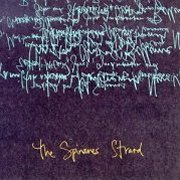 |
Strand (1996, 53.27) **½/T |
|
| Madding Azure Lines and Lines Meridian Punch Line Loser Valency Luminous Oceanwide |
Winter on Ice Watch Down For No One Else |
|
 |
Arches & Aisles (1998, 43.10) **/T |
|
| Kid in Candy Greetings From the Sugar Lick 72-74 Leisure Run Love, the Lazee Sucker's Trial Slide Your Ass Reach v. Speed |
Den Trawler Elegenza Heisman Stance |
|
Current availability:
Mellotrons used:
The Spinanes seem to have considerable critical caché, but going by their second album, '96's Strand, their particular brand of 'slowcore', or whatever you wish to call it, is nowhere near as melancholic of tuneful as, say, Low's, although I can sort of see why other people like them so much. A duo of guitarist/vocalist Rebecca Gates and drummer Scott Plouf, they, like the White Stripes, don't seem to miss having a bassist - something to do with the guitar tone in both cases, I suspect. I can't really pick out anything startling to say about the album, as it left me completely cold, but some of you may like it. One Mellotron track (from Gates), with a passable if inessential strings part on Winter On Ice, but that's yer lot.
Two years on, The Spinanes released their second and last Mellotron album, Arches & Aisles. Musically, it's almost indistinguishable from its predecessor; even more insipid, if that's possible. At least it doesn't go on for too long. Gates plays Mellotron flutes and cellos on the brief Slide Your Ass, but too little overall effect, sadly. You're not going to like either of these albums, I suspect, unless you're a SubPop fan, so with this little Mellotron, I'd really go elsewhere, if I were you.
See: Rebecca Gates
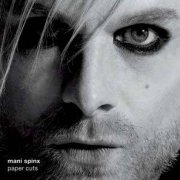 |
Paper Cuts EP (2007, 22.07) **½/½The LiarAllright Heart Attack Lara May Rock'n'Roll Ransom No God |
Current availability:
Mellotron used:
Mads Brøbech "Mani Spinx" Jørgensen had only released one album when his Paper Cuts EP appeared in 2007. It's an oddly unfocussed collection, shifting between more acoustic material (opener The Liar, closer No God), brassy pop/rock (Allright) and rock'n'roll (er, Rock'n'Roll Ransom), amongst others, although that's clearly Spinx' intention.
Spinx plays Mellotron on Lara May, with muted string and cello parts that may or may not be real, although the Mellotronesque strings on Allright are real. I'm not sure whom, outside his (probably mostly Danish) fanbase will really go for this; it's extremely competent, but just not that exciting. Or perhaps I'm simply not 'getting it'. Good enough at what it does, I suppose, but really not worth it for the Mellotron.
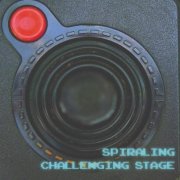 |
Challenging Stage (2004, 15.56) ***½/TTA Face for RadioAh, Sugar Texas is the Reason You Can't Get There |
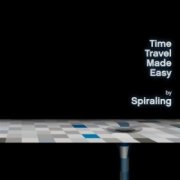 |
Time Travel Made Easy (2008, 48.11) ***/TTT |
|
| Cold Open The Future The Concept of the Quantum-Mechanical Bodymind Has Sparked a Great Idea You Might Say (No Transformation Here) Are You Here Victory Kiss All Kinds of Love |
Enemy Choices Time Machine Count to Four Borrowed Time At Every Turn Victory Kiss (Reprise) |
|
Current availability:
Mellotrons used:
Spiraling were (still are?) a pop/rock outfit including keys man Tom Brislin, who's played with The Strawbs, Meat Loaf, Yes and Renaissance, amongst others. After an initial album, 2002's Transmitter, their first EP, Challenging Stage, appeared two years later, a breezy pop/rock release, probably at its best on the witty Ah, Sugar and excellent, six-minute closer You Can't Get There. Brislin recorded Frank Stickle's Mellotron (Frank is an East Coast Mellotron maintenance expert), with a brief strings part on Texas Is The Reason and more of the same on You Can't Get There.
2008's Time Travel Made Easy is their second and, to date, last release. It seems to me that the band clustered their cheesier material towards the beginning of the album - is this what they call 'frontloading'? - as it improves from Enemy on, other better tracks including Choices and Borrowed Time. Brislin on Frank's Mellotron again, with strings on brief opener Cold Open and The Future, vibes on (deep breath) The Concept Of The Quantum-Mechanical Bodymind Has Sparked A Great Idea, occasional strings on You Might Say (No Transformation Here) and Are You Here, church organ (including a splendid tape-choke) and choirs on Time Machine and cellos on Borrowed Time. An album of two sides then, rather better for its Mellotron content than much of the music, I'm afraid. Oh, and thanks to Frank and Tom for providing the EP tracks.
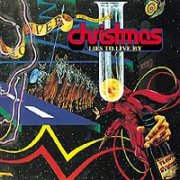 |
Lies to Live By (1974, 41.06) ****/TT½ |
|
| All the Wrong Roads Stay Dead Lazarus Voice in the Wilderness Graveyard Face All is Light War Story Ballad of Jack Boot Requiem - War's Peace |
Factory Where the People Are Made Everything's Under Control Beyond the Fields We Know Prelude (I Don't Know Where I am) Thermopylae Heaven's Lost In Closing |
|
Current availability:
Mellotron used:
The Spirit of Christmas were a later incarnation of Canadian outfit Christmas, the psych/prog of Lies to Live By following the hard rock of Heritage, as the band defied their label's entreaties to be more commercial. It was actually recorded in 1973, but became tied up in the legal system for a year, only eventually receiving a limited release on an indie label, Daffodil. It sounds oddly dated, even for '73, but that doesn't stop it being pretty damn' good, falling somewhere in between the late-'60s sound and the Yes/Gentle Giant school of thought. War Story and Beyond The Fields We Know are probably the best tracks on the album, although Factory is full-on choppy prog mayhem, for those of you for whom nothing is too complex.
There's actually less of band leader Bob Bryden's Mellotron than I'd been led to expect, although I can't tell if the occasional cello part is Mellotronic or real. Assuming the latter, there are Mellotron strings on the second part of War Story and fairly extensive use on the closing Beyond The Fields We Know, both strings and flutes, probably on parts b-d, although it's hard to tell exactly. To sum up, despite being a little dated, Lies to Live By is a good album, with reasonable Mellotron use, though don't go paying a fortune for an original.